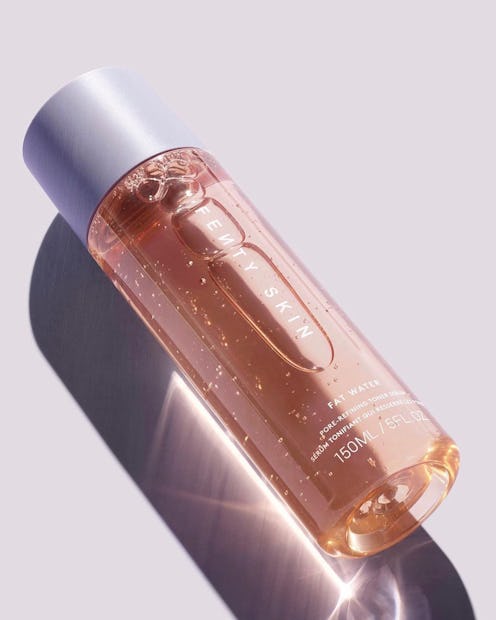(Skin)
Why You're About To See "Toner Serums" Everywhere

In the past five-ish years, our skincare routines have changed a lot. We went from 10+ step routines to “skipcare.” And while we’re certainly not saying to throw out your carefully curated collection of lotions and potions, it turns out there could be real benefits to a condensed skincare routine. Enter: hybrid products like “toner serums" which we'll probably be seeing more of thanks to a few new launches (including Fenty Skin, which drops July 31).
It turns out that condensing our skincare could have real benefits. In fact, dermatologists say overuse of products has actually become a problem, with patients experiencing sensitized, irritated skin from overdoing it when it comes to skincare. “We are seeing more and more people coming in for products related to product use,” Dr. Ranella Hirsch, a Cambridge-based board-certified dermatologist, explains to TZR. She notes that the visits are often connected to overuse of products.
But first, let’s go back to basics for a moment: According to board-certified dermatologist Dr. Dan Belkin, toner, is traditionally an astringent and contains drying agents, like witch hazel, that eliminate sebum or acids, like AHAs and BHAs, that break down dead skin. Serum, on the other hand, typically refers to usually clear lightweight topicals, he notes. They may be solutions just like toners, but can also be light gels or oils. They do not typically contain astringents, but often have humectants and even barrier moisturizing ingredients like oils as well as actives like peptides, retinol, and growth factors.
Both are leave-on products used after cleanser, but before moisturizer, and as you may be starting to see for yourself, more easily combined than you might have thought. And that’s exactly what these hybrid formulas do.
So, while we may typically think of toners as more astringent products meant to eliminate oil, and serums as more viscous formulas meant to deliver actives, the definitions are not set in stone. There are hydrating toners and astringent serums. “Though one might wonder how these two separate forms can be combined, in reality they have overlap and don't have strict definitions, so I'm not surprised they are being conflated,” Belkin says.
How To Choose A Toner Serum
When it comes to making sure you’re picking a formula well-suited to your skin, it’s not so different than choosing any other product. First: patch test: “It may be best to do a test area or only start off using it a few times per week,” she says. Second: pay attention to what ingredients are best for your skin type. “For those with dry skin, it is best to find a product that contains a hydrating ingredient or humectant, such as hyaluronic acid, while those with oily skin would do best with a beta-hydroxy acid such as salicylic acid,” Dr. Marisa Garshick, a New York City-based board-certified dermatologist, explains.
When Should You Use A Toner Serum?
This category of products is so new that it might take some experimentation to determine how these products work in your skincare routine, and if you can truly replace a longer routine with them. "In theory, these new hybrid toner serums might eliminate the need for one or the other for the right user, but of course, as with any product, results will vary," Hirsch says. That said, being that these are lighter-weight products by nature (as opposed to typically thicker nighttime products), they might be best suited for an easy running-out-the-door morning routine.
Depending on the active ingredients in the formula, these products can be used daily or a few times per week. "In general, any product that is exfoliating is generally best used a few times a week to avoid drying the skin out," Garshick explains. Note: exfoliating refers to chemical exfoliants like AHAs and BHAs, which are best used as part of your nighttime skincare routine, only, as they can heighten sun sensitivity. Hydrating formulas, sans chemical exfoliants can be used morning and night.
Of course, "because each individual hybrid serum toner combination may contain a different set of ingredients, it is best to follow the directions as indicated," Garshick adds.
We only include products that have been independently selected by The Zoe Report’s editorial team. However, we may receive a portion of sales if you purchase a product through a link in this article.